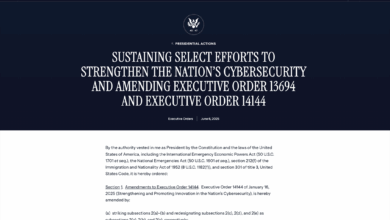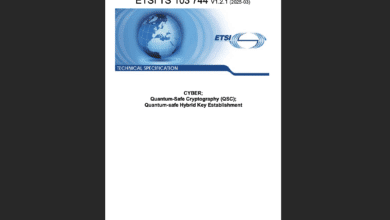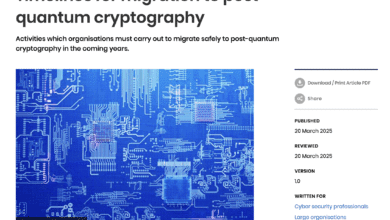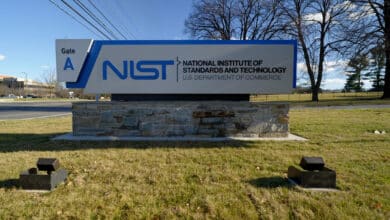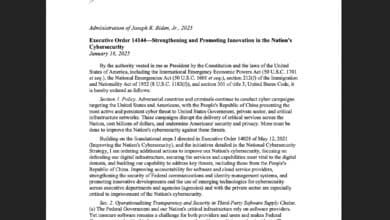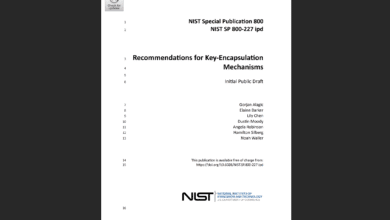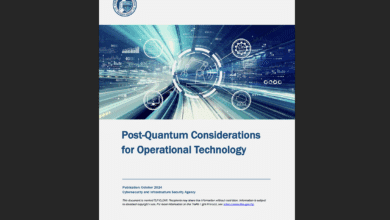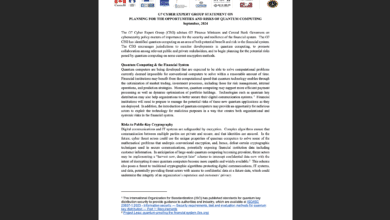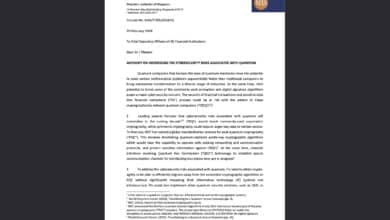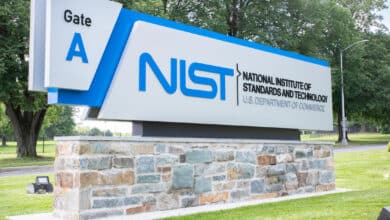Latest Quantum Policy, Standards & Regulations News
-
Jun- 2025 -7 JuneQuantum Policy, Standards & Regulation News
Trump’s New Cybersecurity Order – What Changed and Why It Matters – Quantum Perspective
A New Executive Order Reshapes Cybersecurity Policy: On June 6, 2025, President Donald J. Trump signed a sweeping Executive Order titled “Sustaining Select Efforts to Strengthen the Nation’s Cybersecurity”, which explicitly amends two earlier orders: Obama-era Executive Order 13694 (2015) and the outgoing Biden administration’s Executive Order 14144 (January 16, 2025). This new order largely preserves the overall framework of…
Read More » -
Mar- 2025 -25 MarchQuantum Policy, Standards & Regulation News
ETSI publishes TS 103 744 v1.2.1: Hybrid key establishment for the quantum transition
ETSI’s Technical Committee CYBER has released ETSI TS 103 744 V1.2.1, a technical specification for quantum‑safe hybrid key establishment—methods that combine classical elliptic‑curve Diffie‑Hellman (ECDH) with post‑quantum key encapsulation (ML‑KEM) to derive shared keys that remain secure even if one component is later broken. The new version codifies two combiner constructions, enumerates fixed parameter sets, and ships with test vectors…
Read More » -
24 MarchQuantum Policy, Standards & Regulation News
UK NCSC Releases “Timelines for migration to post-quantum cryptography”
London, UK (NCSC) - The UK’s National Cyber Security Centre (NCSC) this week unveiled new guidance on timelines for migrating to post-quantum cryptography (PQC), outlining a phased roadmap for organizations to shift their encryption methods to quantum-resistant standards by 2035. Announced just days ago, the guidance breaks down key milestones over the next decade to ensure a “smooth and controlled…
Read More » -
11 MarchQuantum Policy, Standards & Regulation News
NIST Picks HQC as New Post-Quantum Encryption Candidate
The U.S. National Institute of Standards and Technology (NIST) has announced today the selection of Hamming Quasi-Cyclic (HQC) as a new post-quantum encryption candidate in its Round 4 of the Post-Quantum Cryptography (PQC) standardization program. HQC’s advancement is especially interesting because it is the only algorithm from NIST’s 4th round of evaluations to be chosen for standardization. This move will…
Read More » -
Jan- 2025 -19 JanuaryQuantum Policy, Standards & Regulation News
Executive Order 14144: Biden’s Big Swing at Cybersecurity Modernization
On January 16 2025 President Joe Biden signed Executive Order 14144, “Strengthening and Promoting Innovation in the Nation’s Cybersecurity.” The 17‑page directive is the administration’s most comprehensive cyber policy since EO 14028 in 2021 and, for the first time, embeds post‑quantum cryptography (PQC) migration deadlines directly in federal law. At its core the order: Puts PQC on a clock. CISA must publish, within 180 days, a list…
Read More » -
9 JanuaryQuantum Policy, Standards & Regulation News
NIST Releases NIST SP 800-227 IPD
NIST has just released the initial public draft of CSWP 48, part of its Migration to Post-Quantum Cryptography project: "Mappings of Migration to PQC Project Capabilities to NIST Cybersecurity Framework 2.0 and to Security and Privacy Controls for Information Systems and Organizations."
Read More » -
Oct- 2024 -28 OctoberQuantum Policy, Standards & Regulation News
CISA’s Post-Quantum OT Guidance: Key Takeaways and Next Steps for CISOs
The U.S. Cybersecurity and Infrastructure Security Agency (CISA) released a landmark report titled ”Post-Quantum Considerations for Operational Technology.” This publication marks the first dedicated federal guidance on how quantum computing threats specifically impact industrial control systems (ICS) and other operational technology (OT) environments. The report comes with a clear warning: OT systems could lag behind IT in achieving quantum-resistant security,…
Read More » -
Sep- 2024 -29 SeptemberQuantum Policy, Standards & Regulation News
G7 Cyber Experts Warn Financial Sector: Prepare Now for Quantum Computing’s Opportunities and Threats
A recent statement by the G7 Cyber Expert Group (CEG) - an advisory panel to G7 finance ministries and central banks - sounds a dual alarm and call to action on quantum computing. In a memo released in late September, the group highlights quantum computing as both a revolutionary opportunity and a looming cyber risk for the financial system. The…
Read More » -
Aug- 2024 -13 AugustQuantum Policy, Standards & Regulation News
NIST Unveils Post‑Quantum Cryptography (PQC) Standards
The U.S. National Institute of Standards and Technology (NIST) has officially announced the release of its first set of post-quantum cryptography (PQC) standards, naming four quantum-resistant algorithms selected to protect data against future quantum-computer attacks. These four algorithms – CRYSTALS-Kyber, CRYSTALS-Dilithium, FALCON, and SPHINCS+ – emerged as the winners of NIST’s multi-year global competition to develop encryption and digital signature…
Read More » -
May- 2024 -24 MayQuantum Policy, Standards & Regulation News
NIST to Release PQC Algorithms in the Summer
The U.S. National Institute of Standards and Technology (NIST) will release post-quantum cryptographic (PQC) algorithms in the upcoming weeks, according to White House cyber advisor Anne Neuberger. This development marks a significant step towards protecting data against future quantum computing threats. Although initially planned to release four algorithms, NIST will finalize and publish three this summer. This move addresses the…
Read More » -
Apr- 2024 -12 AprilQuantum Policy, Standards & Regulation News
New Legislation to Boost U.S. DoD Quantum Capabilities
A recent bill introduced by United States’ Republican lawmakers aims to accelerate the Defense Department’s development and integration of quantum technologies, enhancing capabilities in areas like navigation, sensing, and artificial intelligence. The Defense Quantum Acceleration Act, championed by Rep. Elise Stefanik and Sen. Marsha Blackburn, proposes the creation of a quantum advisor role and a center of excellence within the…
Read More » -
12 AprilQuantum Policy, Standards & Regulation News
EU Publishes a Recommendation on Post-Quantum Cryptography
In another sign of Q-Day concerns and preparations heating up recently, the European Commission has published a key recommendation urging EU member states to adopt a harmonized approach to post-quantum cryptography. This guidance, “Recommendation on a Coordinated Implementation Roadmap for the transition to Post-Quantum Cryptography,” is part of the EU’s proactive strategy to address the vulnerabilities of current cryptographic measures…
Read More » -
Feb- 2024 -27 FebruaryQuantum Policy, Standards & Regulation News
Monetary Authority of Singapore (MAS) Quantum Risk Advisory
On February 20, 2024, the Monetary Authority of Singapore (MAS) issued Circular No. MAS/TCRS/2024/01, titled “Advisory on Addressing the Cybersecurity Risks Associated with Quantum“. Targeted at CEOs of all financial institutions (FIs), the Advisory addresses the emerging cybersecurity challenges posed by quantum computing advancements. It warns of the potential for quantum computers to compromise widely used encryption and digital signature…
Read More » -
Dec- 2023 -23 DecemberQuantum Policy, Standards & Regulation News
NIST Releases SP 1800-38: A Roadmap for Migration to Post-Quantum Cryptography
The National Institute of Standards and Technology (NIST) unveiled Special Publication (SP) 1800-38, “Migration to Post-Quantum Cryptography,” a comprehensive practice guide to help organizations prepare for the quantum era. This guide, developed through the NIST National Cybersecurity Center of Excellence (NCCoE), is structured into three volumes (A, B, and C) and was produced in collaboration with over two dozen industry…
Read More » -
Nov- 2023 -6 NovemberQuantum Policy, Standards & Regulation News
UK NCS Issues Guidance on Preparing for PQC
The UK National Cybersecurity Centre (NCSC) has released a whitepaper titled “Next Steps in Preparing for Post-Quantum Cryptography,” which provides comprehensive guidance to help organisations and providers of Critical National Infrastructure (CNI) prepare for the migration to post-quantum cryptography (PQC). This publication is a follow-up to the NCSC’s 2020 report on the current state of quantum mitigation and aims to…
Read More »
